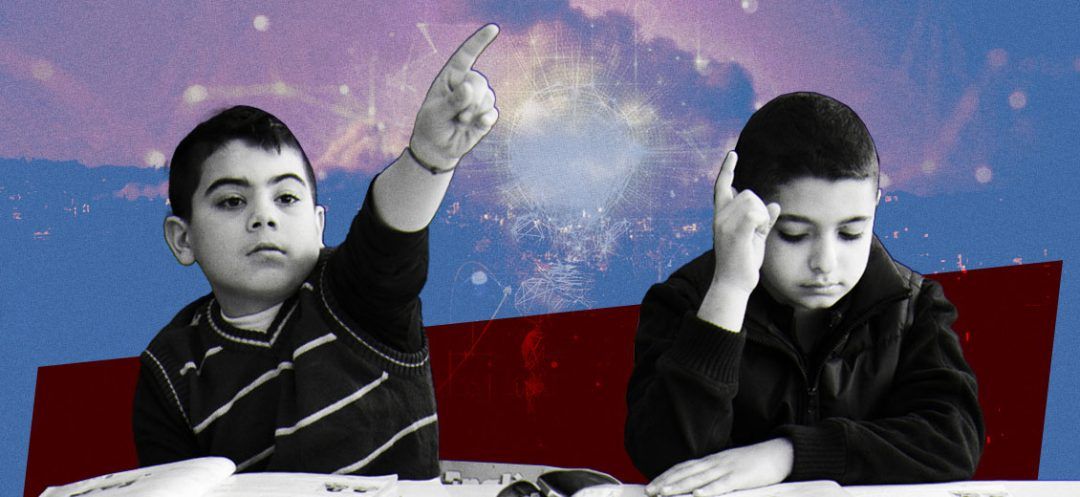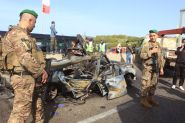
Between the decision to open schools and the decision for remote learning, a school located in a safe area decided to close its doors until security and stability are restored in the country. The school reassured parents that what their children missed will be made up for in person, a decision that was well received by the parents in question.
The new school year across all schools in Lebanon came to a halt last Monday — in many cases even before it started in some schools. This year follows several unstable academic years due to the COVID-19 pandemic, which forced a shift to remote learning, in addition to the poor economic situation that led to long teacher strikes, therefore limiting the curriculum.
It seems that this year will also be rife with instability, as the war that was initially limited to the southern border areas has expanded, causing displacement of families from the South, Bekaa, and the southern suburbs of Beirut to safer zones. These displaced families are now sheltering in public schools across various locations.
This situation prompted the Ministry of Education to request private schools to delay the start of the academic year and not rush to open in order to avoid a significant gap between the start of the academic year in private and public schools. However, some private schools have already begun online education, which has sparked mixed reactions among parents. Some believe they paid the fees, and their children deserve regular education, while others argue that the country's atmosphere is not conducive to focused learning.
Hala, a mother of two students who will begin online learning next Monday, says, "Schools have commitments toward teachers, and we are nearing the beginning of the month, so schools need to pay salaries. Yes, the situation is bad, but teachers need a source of livelihood in these circumstances, and parents have paid the fees. Life is continuing normally in many areas."
On the other hand, Kamal believes that each school should assess its situation regardless of the Ministry's decisions and make the best choice for its students and teachers, recalling that during the civil war, education in schools continued.
Meanwhile, Malak considers the decision to open schools or resort to remote learning unfair for both teachers and students. "The situation now is different from previous crises. Some teachers and students have been displaced from their homes. The internet has weakened recently, making online learning difficult, not to mention the availability of devices for multiple children in the same household."
She adds, "Most of us have taken in displaced families in our homes, and the psychological state of the students doesn't allow them to study calmly. These decisions are failing, and it's better to extend the academic year until things calm down, with a reduction in some lessons."
Mirna believes that "the conditions for remote learning are not available, and since it has already proven to be a failed experience, with schools unable to fix the significant academic gaps caused last year, schools should reconsider this decision."
Amidst the decisions to open schools or opt for remote learning, a school in a safe area decided to close its doors until security and stability are restored in the country. The school reassured parents that their children would catch up on missed in-person education, "even if it requires teaching during holidays or extending the school year, because online learning cannot fully compensate. Also, parents should not be burdened with how to secure the internet and the necessary conditions for online education in these tough times." This decision was supported by the parents.
Meanwhile, Caretaker Education Minister Abbas Halabi called on private educational institutions to ease school fees and reduce financial burdens in these difficult times. However, Ahmad was informed that he needed to pay the first installment of his children's school fees, even though the school has not yet opened.
The new school year across all schools in Lebanon came to a halt last Monday — in many cases even before it started in some schools. This year follows several unstable academic years due to the COVID-19 pandemic, which forced a shift to remote learning, in addition to the poor economic situation that led to long teacher strikes, therefore limiting the curriculum.
It seems that this year will also be rife with instability, as the war that was initially limited to the southern border areas has expanded, causing displacement of families from the South, Bekaa, and the southern suburbs of Beirut to safer zones. These displaced families are now sheltering in public schools across various locations.
This situation prompted the Ministry of Education to request private schools to delay the start of the academic year and not rush to open in order to avoid a significant gap between the start of the academic year in private and public schools. However, some private schools have already begun online education, which has sparked mixed reactions among parents. Some believe they paid the fees, and their children deserve regular education, while others argue that the country's atmosphere is not conducive to focused learning.
Hala, a mother of two students who will begin online learning next Monday, says, "Schools have commitments toward teachers, and we are nearing the beginning of the month, so schools need to pay salaries. Yes, the situation is bad, but teachers need a source of livelihood in these circumstances, and parents have paid the fees. Life is continuing normally in many areas."
On the other hand, Kamal believes that each school should assess its situation regardless of the Ministry's decisions and make the best choice for its students and teachers, recalling that during the civil war, education in schools continued.
Meanwhile, Malak considers the decision to open schools or resort to remote learning unfair for both teachers and students. "The situation now is different from previous crises. Some teachers and students have been displaced from their homes. The internet has weakened recently, making online learning difficult, not to mention the availability of devices for multiple children in the same household."
She adds, "Most of us have taken in displaced families in our homes, and the psychological state of the students doesn't allow them to study calmly. These decisions are failing, and it's better to extend the academic year until things calm down, with a reduction in some lessons."
Mirna believes that "the conditions for remote learning are not available, and since it has already proven to be a failed experience, with schools unable to fix the significant academic gaps caused last year, schools should reconsider this decision."
Amidst the decisions to open schools or opt for remote learning, a school in a safe area decided to close its doors until security and stability are restored in the country. The school reassured parents that their children would catch up on missed in-person education, "even if it requires teaching during holidays or extending the school year, because online learning cannot fully compensate. Also, parents should not be burdened with how to secure the internet and the necessary conditions for online education in these tough times." This decision was supported by the parents.
Meanwhile, Caretaker Education Minister Abbas Halabi called on private educational institutions to ease school fees and reduce financial burdens in these difficult times. However, Ahmad was informed that he needed to pay the first installment of his children's school fees, even though the school has not yet opened.
Read more



Comments